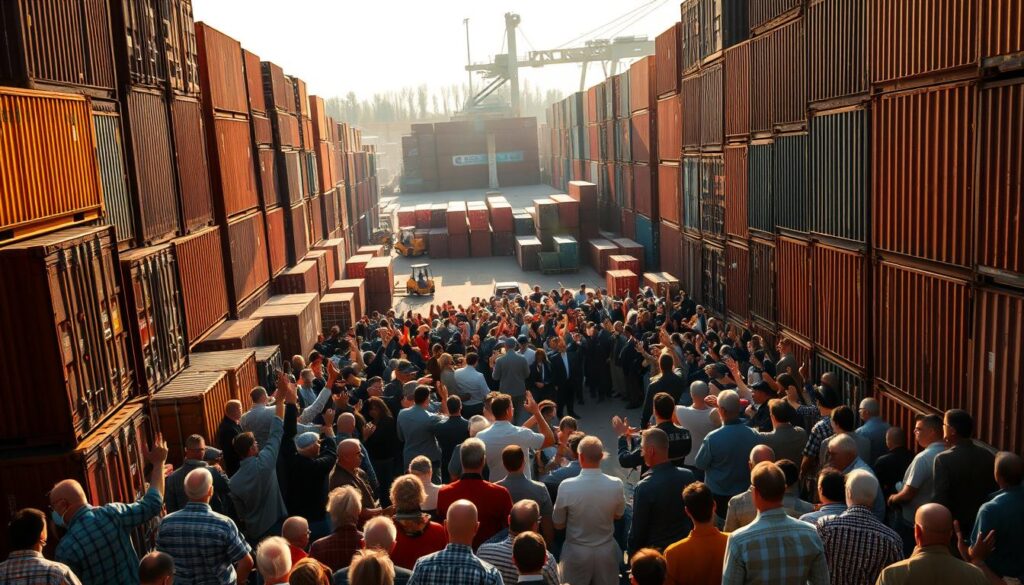Are you considering bidding on a shipping container online but unsure where to start? With various shipping containers available at different price points, making an informed decision can be challenging.
Choosing between new and used shipping containers is a crucial decision that affects your budget and the container’s suitability for your needs. Factors such as the container’s condition, size, and material determine its cost.
Before placing a bid, it’s essential to understand these factors to avoid potential pitfalls. By being cautious and well-informed, you can find the right shipping container that meets your requirements without overspending.
Key Takeaways
- Understand the differences between new and used shipping containers.
- Consider the factors that affect shipping container prices.
- Research the seller and their reputation.
- Inspect the container’s condition before bidding.
- Be aware of additional costs associated with the purchase.
The Growing Market of Online Shipping Container Auctions
With the rise of online auctions, shipping containers are now more accessible than ever for buyers looking for versatile storage or conversion projects. Shipping containers have become highly sought after due to their durability and versatility, with applications ranging from storage solutions to modern homes.
Why Shipping Containers Are in High Demand
The demand for shipping containers is driven by their potential for conversion into various structures, such as homes, offices, and storage facilities. Their durability and security make them an attractive option for both personal and commercial use.
How Online Container Bidding Works
Online container bidding platforms provide a convenient way for buyers to browse and bid on containers. These platforms often include detailed descriptions and inspection reports, helping buyers make informed decisions. To successfully bid, buyers should have an online container bidding checklist to ensure they consider all necessary factors.
Types of Container Auctions Available
There are various types of container auctions available online, including auctions for new (one-trip) containers, used containers, and specialized containers. Understanding the differences between these types is crucial for buyers to find the right container for their needs. Knowing how to bid on shipping containers effectively is key to a successful purchase.
Understanding Container Grades and Classifications
When buying shipping containers online, understanding the different grades and classifications is crucial for making an informed decision. The condition and quality of a shipping container can significantly impact its durability, functionality, and overall value.
New (One-Trip) vs. Used Containers
New shipping containers, often referred to as “one-trip” containers, have been used only once to transport goods from the manufacturer to their destination. They are in near-perfect condition, with minimal signs of wear. On the other hand, used containers may show more wear and tear, such as rust or dents, but can still be structurally sound and suitable for various applications.
Cargo Worthy vs. Wind and Water Tight
Containers classified as Cargo Worthy are deemed fit for shipping goods, having passed inspections for damage or wear that could affect their cargo-carrying capacity. Wind and Water Tight containers, while not necessarily suitable for cargo transport, are still secure against the elements. They may have some defects but are generally in better condition than As-Is containers.
As-Is Containers: What to Expect
As-Is containers are sold in their current condition, without warranties. Buyers should be prepared for potential defects, which can include:
Common Defects in Lower-Grade Containers
- Rust and corrosion
- Dents and damaged corners
- Damaged or missing parts (e.g., doors, seals)
- Internal damage (e.g., flooring, lining)
Understanding these classifications can help buyers navigate the complexities of container auctions and make more informed purchasing decisions. By knowing what to expect from different container grades, buyers can better assess the value and potential uses of their purchase.
Container Specifications and Suitability
Before you bid on a shipping container, it’s essential to consider its specifications and suitability. Understanding these factors is crucial for making an informed decision that meets your specific needs.
Standard Dimensions and Weight Capacities
Shipping containers come in various sizes, with 20-foot and 40-foot containers being the most common. The dimensions and weight capacities of these containers are standardized, making it easier to plan and execute logistics. For instance, a standard 20-foot container is typically 20 feet long, 8 feet wide, and 8.5 feet high, with a maximum gross weight capacity ranging from 24,000 to 30,480 kilograms, depending on the manufacturer.
Specialized Container Types
Not all shipping containers are created equal; there are specialized types designed for specific purposes.
Refrigerated (Reefer) Containers
Refrigerated containers are equipped with cooling systems, making them ideal for transporting perishable goods that require temperature control. These containers are perfect for businesses that need to keep their products fresh during transit.
Open Top and Flat Rack Options
Open-top containers allow for the loading of oversized cargo from the top, while flat rack containers are used for heavy or oversized loads that don’t fit within standard container dimensions. Both options provide flexibility for unique cargo requirements.
Matching Container Type to Your Needs
To ensure you select the right container, consider the following factors:
- The type of goods you need to transport or store
- The required temperature control or special handling
- The available space and logistical constraints
- The weight and volume of your cargo
By carefully evaluating these factors and understanding the different container specifications, you can make a more informed decision when bidding on shipping containers online.
5 Things to Check Before Bidding on a Shipping Container Online
Before placing a bid on a shipping container online, there are several critical factors to consider to ensure a successful transaction. Bidding on a shipping container can be a complex process, and being informed is key to making the right purchase.
1. Container Condition and Inspection Reports
Inspecting the condition of the shipping container is crucial, especially when buying used. Look for detailed inspection reports that highlight the container’s condition.
Rust and Corrosion Assessment
Check for any signs of rust or corrosion, as these can significantly affect the container’s durability and lifespan. A thorough assessment will help you understand the container’s overall health.
Structural Integrity Verification
Verify the structural integrity of the container to ensure it can withstand various environmental conditions. This step is vital in determining the container’s suitability for your needs.
2. Seller Reputation and History
Researching the seller’s reputation and history is essential. Look for sellers with positive feedback and a track record of successful transactions.
3. Total Cost Including Delivery
Calculate the total cost of the container, including delivery charges. Factor in any additional costs to avoid unexpected expenses.
4. Container Age and Previous Usage
Understanding the container’s age and previous usage can provide insights into its remaining lifespan and potential for future use. Older containers or those with heavy previous usage may require more maintenance.
5. Return Policies and Guarantees
Check if the seller offers any return policies or guarantees. Knowing your options in case the container does not meet your expectations is crucial.
Key Takeaways:
- Inspect the container condition thoroughly.
- Research the seller’s reputation.
- Calculate the total cost, including delivery.
- Consider the container’s age and previous usage.
- Understand the return policies and guarantees.
By following these guidelines, you can make an informed decision when bidding on a shipping container online. Ensuring that you inspect the container, research the seller, and understand all the costs involved will lead to a successful purchase.
How to Verify Container Condition Remotely
To ensure you’re making a smart purchase, verifying the container’s condition remotely is essential. When buying a shipping container online, you can’t physically inspect it, so you need to rely on other methods to assess its condition.
Requesting Additional Photos and Videos
One effective way to verify a container’s condition is by requesting additional photos and videos from the seller. Ask for close-ups of critical areas such as the roof, doors, and corners, where damage often occurs. A video walkaround can also provide valuable insights into the container’s overall condition.
Understanding Container Inspection Certificates
Container inspection certificates are documents provided by inspection companies that verify the condition of a container. These certificates typically detail any damage, rust, or other issues. Understanding what’s included in these reports can help you make an informed decision.
Using Third-Party Inspection Services
If you’re still unsure about the container’s condition, consider hiring a third-party inspection service. These professionals can conduct a thorough inspection and provide a detailed report.
What Inspectors Look For
Inspectors typically check for signs of damage, rust, or wear and tear. They inspect the container’s structural integrity, including the roof, walls, doors, and flooring. They also verify that the container is wind and water tight, ensuring it’s suitable for storage or shipping.
By using these methods, you can confidently verify the condition of a shipping container remotely, ensuring you make a well-informed purchase.
Pricing Strategies for Container Bidding
To navigate the complex world of online shipping container auctions, you need to grasp the key pricing strategies. Understanding these strategies will help you make informed decisions and avoid costly mistakes when buying shipping containers online.
Current Market Rates by Container Type
The price of a shipping container can vary widely depending on several key factors, including condition, size, and type. For instance, new (one-trip) containers typically cost more than used ones. It’s essential to research current market rates for different container types to determine a fair price. Websites that list container auctions often provide valuable data on recent sales, helping you gauge the market.

Setting Your Maximum Bid Amount
Before bidding, it’s crucial to set a maximum bid amount based on your budget and the container’s value. This amount should be determined by considering the container’s condition, age, and your specific needs. Sticking to your maximum bid amount will help you avoid getting caught up in the excitement of bidding and overspending.
Hidden Costs to Factor Into Your Budget
Beyond the bid price, there are several hidden costs to consider when buying a shipping container online. These include:
- Delivery and placement fees
- Customs and import duties
- Any necessary modifications or repairs
Delivery and Placement Fees
Delivery and placement fees can add significant costs to your purchase. These fees vary depending on the container’s location and your site’s accessibility. Ensure you factor these costs into your budget to avoid surprises.
Customs and Import Duties
If you’re importing a container, you’ll need to consider customs and import duties. These costs can vary widely depending on your location and the container’s origin. Researching these costs ahead of time will help you plan your budget more effectively.
By understanding current market rates, setting a maximum bid amount, and factoring in hidden costs, you can develop a robust pricing strategy for container bidding. This knowledge will empower you to navigate online container auctions with confidence and make smart purchasing decisions.
Legal Considerations and Documentation
Purchasing a shipping container online requires not only a good understanding of the market but also knowledge of the legal framework surrounding container ownership. As you prepare to bid on a shipping container, it’s essential to be aware of the legal considerations and necessary documentation.
Essential Paperwork for Container Ownership
Once you’ve won a bid, you’ll need to complete the necessary paperwork to transfer ownership. This typically includes a sales contract and a bill of sale. Ensure that all documents are thoroughly reviewed and understood before finalizing the purchase.
Local Zoning and Permit Requirements
Before bringing your new container home, check with local authorities to determine if there are any zoning restrictions or permit requirements. Failure to comply can result in fines or even container confiscation. Researching these regulations upfront can save you a significant headache.
Insurance Considerations for Shipping Containers
Insurance is another critical aspect to consider when owning a shipping container. You’ll want to protect your investment against damage or loss.
“Insurance can provide peace of mind, knowing that your container is covered in case of unforeseen events.”
Shop around for insurance providers that specialize in shipping containers to find the best rates.
By understanding the legal considerations and documentation required for shipping container ownership, you can ensure a smooth and successful transaction. Be patient and thorough in your preparation to avoid potential pitfalls.
Common Mistakes to Avoid When Bidding Online
To ensure a successful online bidding experience, it’s essential to steer clear of common errors. Bidding on shipping containers online can be a complex process, and being aware of the potential pitfalls can save you time, money, and stress.
Impulse Bidding Without Research
One of the most significant mistakes bidders make is failing to conduct thorough research on the container they are bidding on. This includes understanding the container’s history, condition, and specifications. Always review inspection reports and ask for additional photos or videos if necessary.
As a seasoned bidder once said,
“The key to a successful bid is not just about being the highest bidder, but being the most informed.”
Ignoring Delivery Logistics
Delivery logistics can be a costly and complicated aspect of purchasing a shipping container. Failing to consider the costs and challenges associated with transporting the container to its final destination can lead to unexpected expenses. Make sure to factor in delivery costs and assess the feasibility of transporting the container to your desired location.
Overlooking Necessary Modifications
Containers may require modifications to suit your specific needs. Overlooking these necessary modifications can result in additional costs down the line. Consider what modifications are required and factor these into your overall budget.
| Modification Type | Cost Estimate | Timeline |
|---|---|---|
| Adding doors or windows | $500-$1,000 | 1-2 weeks |
| Electrical or plumbing installations | $1,000-$3,000 | 2-4 weeks |
| Insulation and lining | $2,000-$5,000 | 2-6 weeks |
Falling for Too-Good-To-Be-True Prices
If the price of a container seems too good to be true, it probably is. Be cautious of extremely low prices, as they may indicate hidden problems or scams. Always research the market value of the container and be wary of deals that seem unusually cheap.

By being aware of these common mistakes, you can navigate the online shipping container bidding process with confidence. Remember to stay informed, plan carefully, and bid wisely.
Success Stories: Smart Container Purchases
With the right strategy, buying a shipping container online can be a rewarding experience, as seen in numerous success stories. Individuals and businesses alike have found value in online container auctions, securing containers that meet their specific needs.
Home Builder’s Container Conversion Project
A home builder in California successfully purchased a used shipping container online and converted it into a modern home office. The container was Cargo Worthy, ensuring it was structurally sound for modification. The builder praised the online auction platform for providing detailed inspection reports and photos, making the process transparent and trustworthy.
Small Business Storage Solution
A small business in Texas used an online auction to acquire a Wind and Water Tight container for storage purposes. The business owner appreciated the ability to bid remotely and have the container delivered directly to their site. This purchase significantly reduced their storage costs and improved operational efficiency.
Lessons Learned from Successful Bidders
Successful bidders emphasize the importance of thorough research and understanding the container’s history and condition. They also highlight the value of working with reputable sellers who provide comprehensive inspection reports.
| Success Factor | Description | Benefit |
|---|---|---|
| Thorough Research | Understanding container history and condition | Informed bidding decisions |
| Reputable Sellers | Sellers providing comprehensive inspection reports | Reduced risk of post-purchase surprises |
| Clear Communication | Accurate descriptions and prompt responses | Smooth transaction process |
These success stories demonstrate that with careful planning and the right resources, buying shipping containers online can be a successful and satisfying experience.
Conclusion
With the key points outlined in this article, you’re now well-equipped to make an informed decision when bidding on a shipping container online. By understanding the 5 Things to Check Before Bidding on a Shipping Container Online, you can avoid potential pitfalls and ensure a successful purchase.
Taking the necessary Precautions for bidding on shipping containers is crucial to securing a reliable and dependable container that meets your needs. Whether you’re planning to use the container for transporting goods or repurposing it for storage or other uses, a thorough evaluation of the container’s condition, seller’s reputation, and total cost is essential.
By being cautious and informed, you can confidently bid on a shipping container online, knowing that you’re making a worthy investment. Shipping containers are versatile and reliable, making them a valuable asset for various applications.

